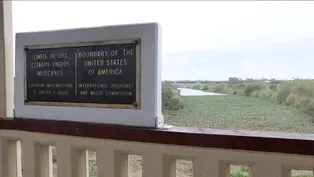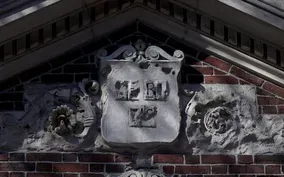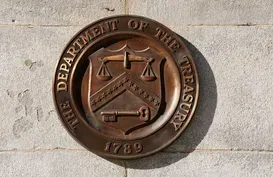
Students face changes as Ohio law rolls back DEI initiatives
Clip: 5/13/2025 | 9m 22sVideo has Closed Captions
Ohio students face changes on campus as new state law rolls back diversity initiatives
Since taking office in January, the Trump administration has targeted diversity, equity and inclusion efforts nationwide, including on college campuses. In Ohio, a new state law is also challenging DEI programs, leaving students and faculty on both sides of the issue bracing for change. William Brangham reports for our series, Rethinking College.
Problems with Closed Captions? Closed Captioning Feedback
Problems with Closed Captions? Closed Captioning Feedback
Major corporate funding for the PBS News Hour is provided by BDO, BNSF, Consumer Cellular, American Cruise Lines, and Raymond James. Funding for the PBS NewsHour Weekend is provided by...

Students face changes as Ohio law rolls back DEI initiatives
Clip: 5/13/2025 | 9m 22sVideo has Closed Captions
Since taking office in January, the Trump administration has targeted diversity, equity and inclusion efforts nationwide, including on college campuses. In Ohio, a new state law is also challenging DEI programs, leaving students and faculty on both sides of the issue bracing for change. William Brangham reports for our series, Rethinking College.
Problems with Closed Captions? Closed Captioning Feedback
How to Watch PBS News Hour
PBS News Hour is available to stream on pbs.org and the free PBS App, available on iPhone, Apple TV, Android TV, Android smartphones, Amazon Fire TV, Amazon Fire Tablet, Roku, Samsung Smart TV, and Vizio.
Providing Support for PBS.org
Learn Moreabout PBS online sponsorshipAMNA NAWAZ: Since taking office in January, the Trump administration has targeted diversity, equity, and inclusion efforts nationwide, including on college campuses.
GEOFF BENNETT: William Brangham recently traveled to Ohio, where a new state law is also targeting DEI programs, leaving students and faculty on both sides of the issue bracing for change.
It's part of our series Rethinking College.
WILLIAM BRANGHAM: At Ohio University in Athens, spring semester is winding down.
Students are getting ready for graduation and prepping for finals.
Junior Kylie Bridgeman, one of more than 16,000 undergrads here, heads a Black student organization which helped organize this year-end 5K.
But students have not been able to outrun a controversy over a recently passed law known as S.B.1, which eliminates all diversity, equity and inclusion programs on all public colleges and universities in the state.
KYLIE BRIDGEMAN, Ohio University Student: I think that, for a lot of students, it'll change nearly everything.
And for some students it won't change that much at all.
But I think that it's just really going to impact people even if they don't recognize that it will, because people don't realize just how much they benefit from DEI.
STATE SEN. JERRY CIRINO (R-OH): It is about eliminating what has become, in my view, institutional discrimination through the establishment and economic support of DEI programs.
WILLIAM BRANGHAM: Republican State Senator Jerry Cirino sponsored S.B.1, which, among other things, also puts limits on scholarships that have DEI requirements, mandates that schools create a system where students can complain about the lack of intellectual diversity, and bans faculty strikes.
PROTESTER: What's important today and what's important at Ohio University is our stories, our legacies, our experience and what we go through.
WILLIAM BRANGHAM: In February, Bridgeman helped organize a class walkout in march to protest S.B.1.
KYLIE BRIDGEMAN: It was a really powerful display of unity, because DEI encompasses a lot more people than they realize.
And the crowd demonstrated that.
WILLIAM BRANGHAM: Two of those marchers were junior Audrey Ansel and senior Mia Walsh.
Both work at the Pride Center on campus, a center to support LGBTQ students.
It, along with the school's Multicultural Center and the Women's Center, will be required to close under the new law.
MIA WALSH, Ohio University Student: These centers act as possibility models for incoming students and students that are maybe touring the campus.
Knowing that there was a Pride Center at Ohio University greatly influenced my decision to come here.
AUDREY ANSEL, Ohio University Student: It does feel like an effort to erase us, because the dialogue in the classroom isn't going to change.
Like, queer people aren't going to go away.
This campus isn't going to become less diverse.
We have always been here.
We will always be here.
But why do these physical spaces that mean so much to us have to go away?
What does that really do for higher ed?
And I can't see that it does anything positive.
WILLIAM BRANGHAM: Since S.B.1 became law -- it was signed back in March by Ohio's Republican governor, Mike DeWine -- public colleges and universities across the state, including here at Ohio University, have been scrambling to implement the law by its late June deadline.
LORI STEWART GONZALEZ, President, Ohio University: There are questions about what we're going to do about diversity, equity and inclusion.
WILLIAM BRANGHAM: University President Lori Lee Gonzalez declined our interview request, but has written that while the university is committed to -- quote -- "building and supporting a sense of belonging, we must also follow the law."
EDDITH DASHIELL, Director, E.W.
Scripps School of Journalism, Ohio University: The exam is Monday, 12:20.
WILLIAM BRANGHAM: Eddith Dashiell is director of the E.W.
Scripps School of Journalism at Ohio University.
Do you wish the administration of this university had acted differently when this law was coming out?
EDDITH DASHIELL: Yes.
There hasn't been a single person in the leadership position at any university in the state of Ohio who has publicly come out against this bill.
WILLIAM BRANGHAM: Not one?
EDDITH DASHIELL: Not one.
WILLIAM BRANGHAM: Dashiell sees the law as part of a trend pointing to when the university paused more than $40,000 in diversity scholarships last year after the Supreme Court's affirmative action decision and the postponement of a school-sponsored Black alumni reunion this spring.
She believes the new law will have far-reaching consequences.
EDDITH DASHIELL: Diversity is important.
And any attempt like this Ohio law to say that we need to get rid of woke ideology is a direct attack on me and people who look like me.
It's trying to erase my history.
It's trying to negate the contributions I have made.
It's saying that I don't count, I'm not qualified, I don't have merit.
And all of that is not true.
WILLIAM BRANGHAM: But for others at Ohio University, laws like S.B.1 are necessary to combat what they argue is a leftward drift on college campuses.
RICHARD VEDDER, Professor Emeritus of Economics, Ohio University: We have gotten away from the basics.
And DEI is one example of it.
It's not the only example.
WILLIAM BRANGHAM: Richard Vedder is a professor emeritus of economics at Ohio University and the author of the new book "Let Colleges Fail."
RICHARD VEDDER: The concept of diversity is a positive one.
I have no problem with that.
But the notion that should Trump or outweigh other considerations, especially academic accomplishment, be it in the student in terms of academic performance, be it in the faculty in terms of publications, or I think to say, no, we need to promote so-and-so because she is X is wrong.
WILLIAM BRANGHAM: Vedder says schools have gone overboard hiring various DEI administrators, and while he's apprehensive about politicians meddling in higher ed, he supported S.B.1.
LINDA MCMAHON, U.S. Education Secretary: We should be looking at those who have real merit to get in, and we have to look harder at those universities that aren't enforcing that.
WILLIAM BRANGHAM: The changes in Ohio aren't happening in a vacuum.
The Trump administration is attacking DEI efforts nationwide.
The Education Department warned schools that federal funding could be cut if diversity initiatives are not eliminated.
That threat is currently on hold because a federal judge blocked it.
The administration has also targeted university accreditation over DEI policies.
RICHARD VEDDER: DEI is not the only problem that higher ed faces, but it's a big one, and it's been a growing one.
WILLIAM BRANGHAM: And you saw S.B.1 as a corrective to that?
RICHARD VEDDER: And it's a corrective.
It's a corrective.
Is it a perfect corrective?
No.
But the severity of the problem was -- in my judgment, was big enough that it justified taking some risks with respect to that.
AIDEN FOX, President, Ohio University College Republicans: College Republicans, please stand for the Pledge of Allegiance.
WILLIAM BRANGHAM: And student opinion on ending DEI programs is also not unanimous.
Junior Aiden Fox is president of the Ohio University College Republicans.
He sees S.B.1 as helping correct the political bias he says conservatives face on campus.
AIDEN FOX: After Election Day, every student got an e-mail from the university saying that the Women's Center and the Multicultural Center, in collaboration with campus counseling and psychological services, was hosting a space for students to come in, essentially grieve and vent about the election, right?
WILLIAM BRANGHAM: Because Trump had won.
AIDEN FOX: Yes.
And if you're one of the people who are celebrating after that night, what kind of message is your university that you're paying thousands upon thousands of dollars sending to you?
WILLIAM BRANGHAM: For FOX, ending the university's financial support for spaces like the Pride Center, which he argues has a left-wing ideological framework, is about fairness to all students.
AIDEN FOX: If it was a normal student-run organization, I wouldn't have any issue with that whatsoever.
I wouldn't expect them to accept me into that space.
The issue with that is, it is officially a DEI office ran by the school, funded by the school, and I'm paying for it in two separate ways, the first way as a tuition payer in O.U., but the other way before S.B.1 was I was also paying for it as a taxpayer.
AUDREY ANSEL: These are a huge part of the Pride Center's history, as well as just queer history.
WILLIAM BRANGHAM: After the passage of S.B.1, Audrey Ansel and Mia Walsh helped move books that were housed in the Pride Center to a space just off campus at United Campus Ministry, a nonprofit that works on social justice issues.
AUDREY ANSEL: The fear was that all of these books would just end up in a dumpster.
WILLIAM BRANGHAM: The organization was home to some of Ohio University's first LGBT groups in the late '80s and '90s and will now play a role in providing space off campus.
Opponents of S.B.1 are not giving up.
They're undertaking a campaign to try and repeal the law by referendum, a process that first requires collecting nearly a quarter-million signatures by late June.
For the "PBS News Hour," I'm William Brangham in Athens, Ohio.
Baseball reinstates Pete Rose and Shoeless Joe Jackson
Video has Closed Captions
Clip: 5/13/2025 | 5m 28s | Baseball reinstates Pete Rose and Shoeless Joe Jackson, making them Hall of Fame eligible (5m 28s)
Family reflects on 1950s U.S. deportation effort
Video has Closed Captions
Clip: 5/13/2025 | 3m 7s | Family who lived through 1950s U.S. deportation effort reflects on current climate (3m 7s)
Mideast experts weigh in on Trump's economic, defense deals
Video has Closed Captions
Clip: 5/13/2025 | 9m 5s | Mideast experts weigh in on Trump's economic and defense deals in the region (9m 5s)
Minnesota works to address disappearances of Black women
Video has Closed Captions
Clip: 5/13/2025 | 7m 18s | Minnesota works to address murders and disappearances of Black women (7m 18s)
News Wrap: Another $450 million in Harvard grants terminated
Video has Closed Captions
Clip: 5/13/2025 | 5m 14s | News Wrap: White House terminates another $450 million in grants to Harvard (5m 14s)
Trump sets new course for American policy in Middle East
Video has Closed Captions
Clip: 5/13/2025 | 4m 43s | Trump arrives in Saudi Arabia as he sets new course for American policy in Middle East (4m 43s)
What trouble in the bond market means for your investments
Video has Closed Captions
Clip: 5/13/2025 | 7m 22s | What trouble in the bond market means for your investments and the economy (7m 22s)
Providing Support for PBS.org
Learn Moreabout PBS online sponsorshipSupport for PBS provided by:
Major corporate funding for the PBS News Hour is provided by BDO, BNSF, Consumer Cellular, American Cruise Lines, and Raymond James. Funding for the PBS NewsHour Weekend is provided by...


















